Unit 13 We're trying to save the earth! Section A Period 2 2d-4b 课件(共24张PPT) 人教版英语九年级全册
文档属性
| 名称 | Unit 13 We're trying to save the earth! Section A Period 2 2d-4b 课件(共24张PPT) 人教版英语九年级全册 |
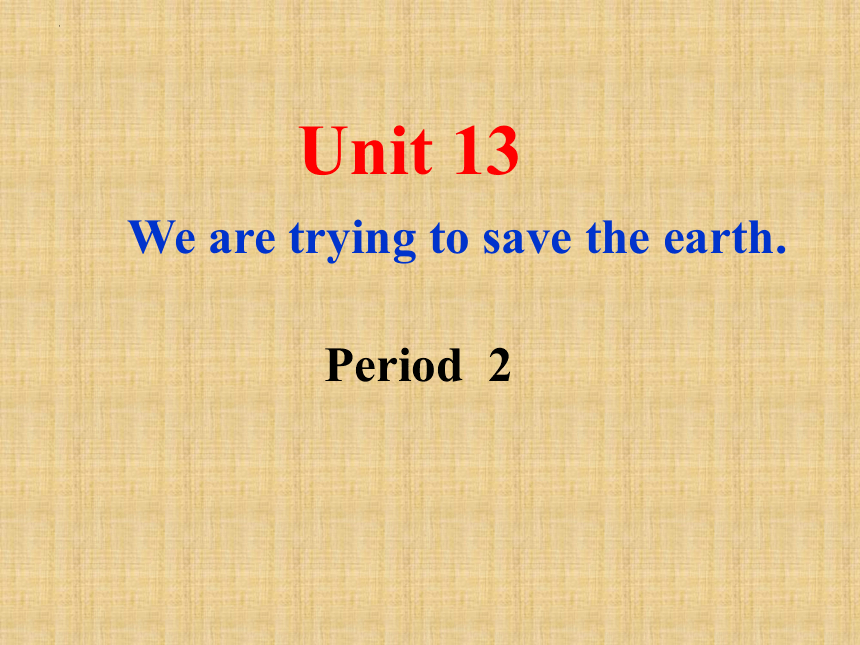
|
|
| 格式 | pptx | ||
| 文件大小 | 1.4MB | ||
| 资源类型 | 教案 | ||
| 版本资源 | 人教新目标(Go for it)版 | ||
| 科目 | 英语 | ||
| 更新时间 | 2024-09-16 00:00:00 | ||
图片预览

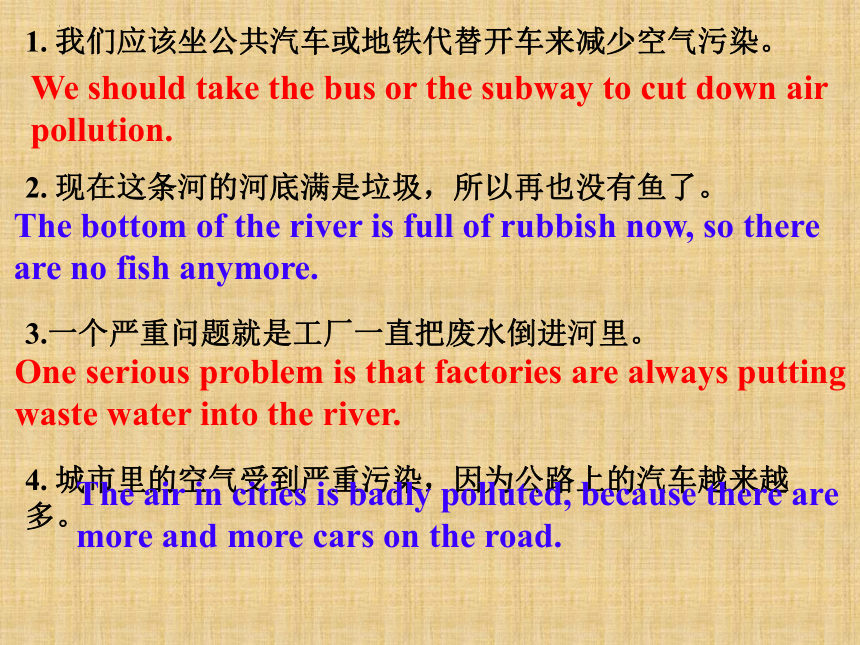
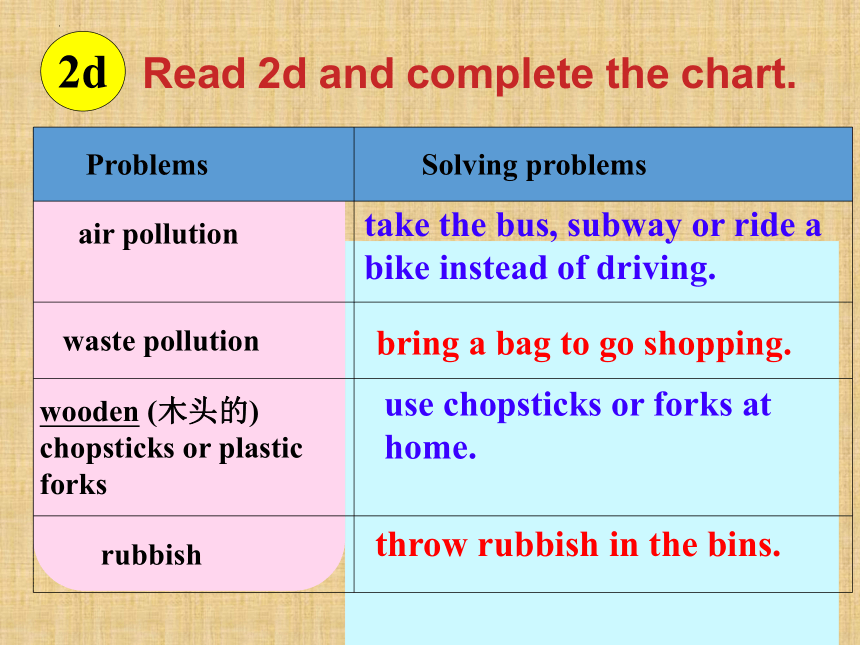
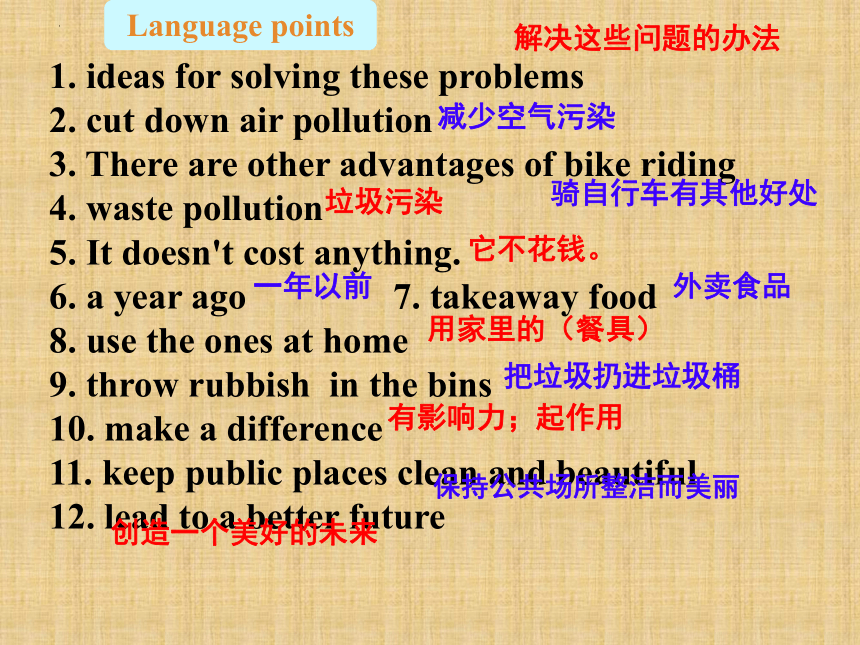
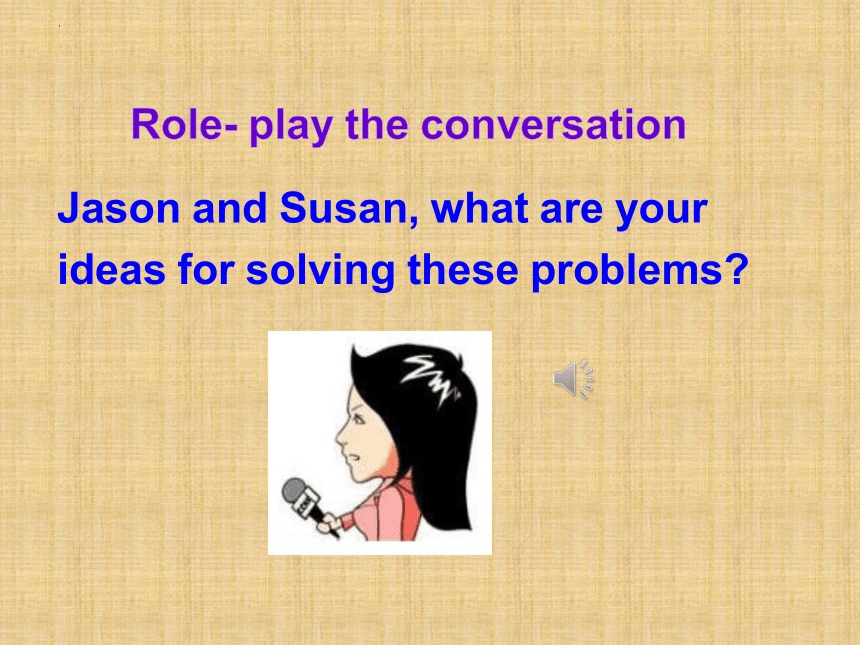
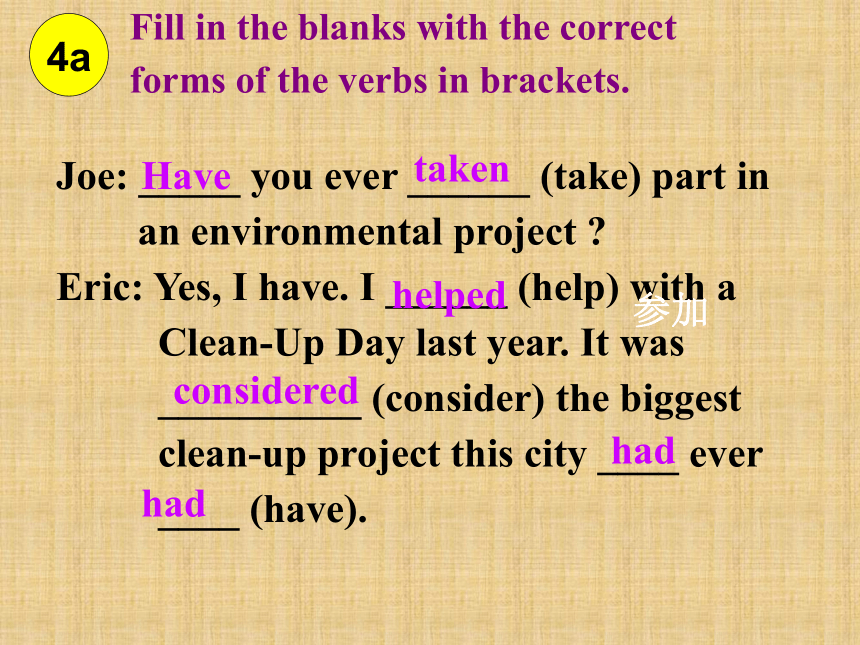
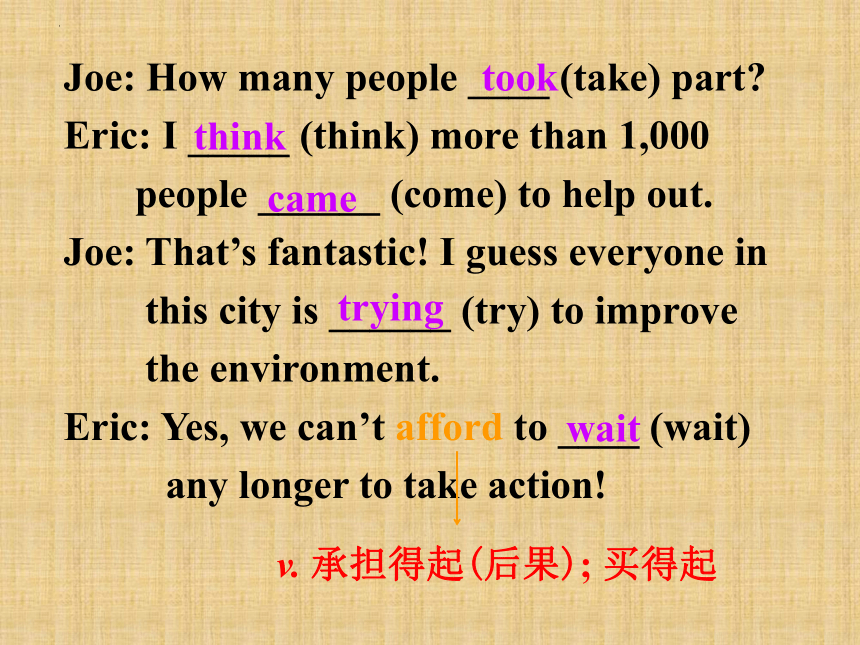
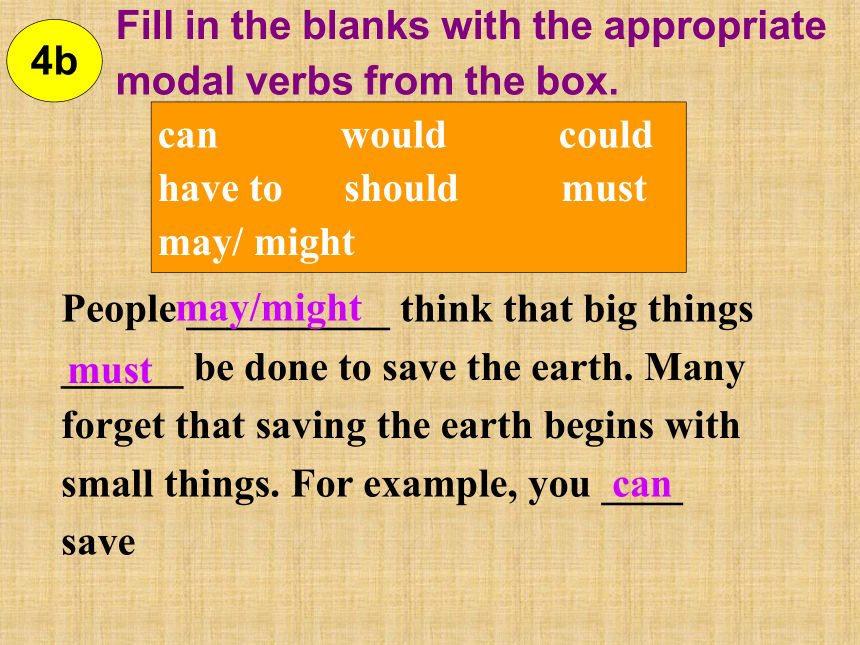
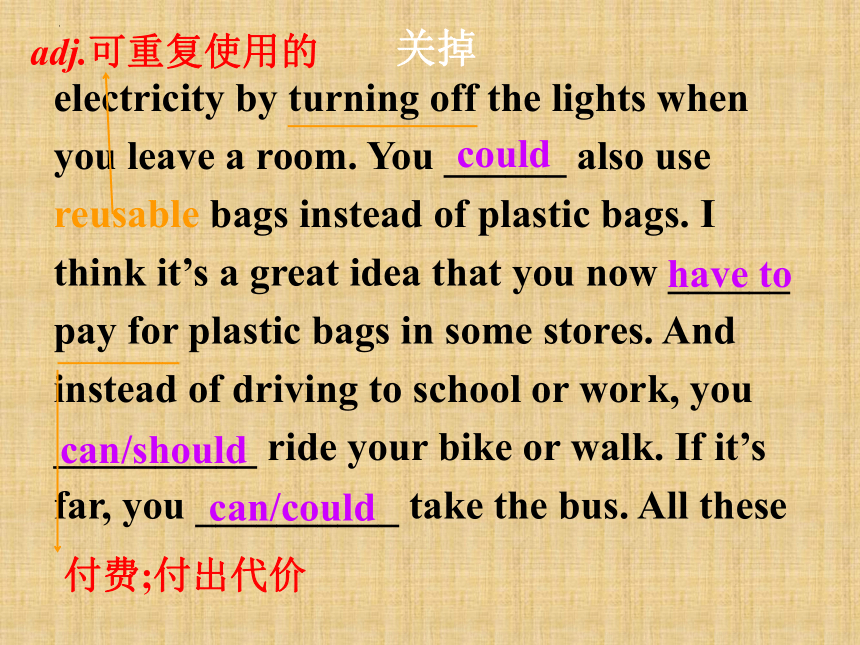
文档简介
(共24张PPT)
Unit 13
We are trying to save the earth.
Period 2
1. 我们应该坐公共汽车或地铁代替开车来减少空气污染。
2. 现在这条河的河底满是垃圾,所以再也没有鱼了。
3.一个严重问题就是工厂一直把废水倒进河里。
4. 城市里的空气受到严重污染,因为公路上的汽车越来越多。
We should take the bus or the subway to cut down air
pollution.
The bottom of the river is full of rubbish now, so there
are no fish anymore.
One serious problem is that factories are always putting
waste water into the river.
The air in cities is badly polluted, because there are
more and more cars on the road.
2d
Read 2d and complete the chart.
Problems Solving problems
air pollution
waste pollution
wooden (木头的) chopsticks or plastic forks
rubbish
take the bus, subway or ride a bike instead of driving.
bring a bag to go shopping.
use chopsticks or forks at home.
throw rubbish in the bins.
1. ideas for solving these problems
2. cut down air pollution
3. There are other advantages of bike riding
4. waste pollution
5. It doesn't cost anything.
6. a year ago 7. takeaway food
8. use the ones at home
9. throw rubbish in the bins
10. make a difference
11. keep public places clean and beautiful
12. lead to a better future
解决这些问题的办法
减少空气污染
垃圾污染
骑自行车有其他好处
它不花钱。
一年以前
外卖食品
用家里的(餐具)
把垃圾扔进垃圾桶
有影响力;起作用
保持公共场所整洁而美丽
创造一个美好的未来
Language points
Role- play the conversation
Jason and Susan, what are your ideas for solving these problems
4a
Fill in the blanks with the correct forms of the verbs in brackets.
Joe: _____ you ever ______ (take) part in
an environmental project
Eric: Yes, I have. I ______ (help) with a
Clean-Up Day last year. It was
__________ (consider) the biggest
clean-up project this city ____ ever
____ (have).
Have
taken
helped
considered
had
had
参加
Joe: How many people ____ (take) part
Eric: I _____ (think) more than 1,000
people ______ (come) to help out.
Joe: That’s fantastic! I guess everyone in
this city is ______ (try) to improve
the environment.
Eric: Yes, we can’t afford to ____ (wait)
any longer to take action!
took
think
came
trying
wait
v. 承担得起(后果); 买得起
4b
Fill in the blanks with the appropriate
modal verbs from the box.
People __________ think that big things
______ be done to save the earth. Many
forget that saving the earth begins with
small things. For example, you ____ save
may/might
must
can
can would could
have to should must
may/ might
electricity by turning off the lights when
you leave a room. You ______ also use
reusable bags instead of plastic bags. I think it’s a great idea that you now ______ pay for plastic bags in some stores. And instead of driving to school or work, you __________ ride your bike or walk. If it’s far, you __________ take the bus. All these
could
have to
can/should
can/could
关掉
adj.可重复使用的
付费;付出代价
small things ______ add up and become big things that _________ improve the environment. Let’s take action now!
could
would/can
采取行动
Pay attention to the sentences.
1. We’re trying to save the earth.
2. The river used to be so clean.
3. The air is badly polluted.
4. No scientific studies have shown that shark fins are good for health.
5. We should help save the sharks.
Grammar Focus
现在进行时: Present Progressive
结构: be (am/is/are) + v.-ing
标志词:Look, Listen, now, right now…
e.g. Look! The boy is crying.
定义:表示说话时(瞬间)正在进行的动作, 也表示目前或现阶段正在进行的动作。
What a fine day today!
Look! What are they doing
Exercise
used to do sth. 表示过去常常做某事, 而现
在往往不做了, 后接动词原形。
be used to doing sth. 表示习惯于做某事
e.g. I used to get up at six o’clock.
Joe is used to drinking a cup of coffee every morning.
used to do与be used to doing
Translation.
1. 她过去常常周末和朋友闲逛。
She used to hang out with friends on weekends.
2. 他习惯于每天晚上睡得很晚。
He is used to staying up.
Exercise
被动语态:Passive voice
定义:表示主语是动作的承受者,即行
为动作的对象的一种语态。
结构:be + 过去分词
e.g. A new school was built last year.
Our classroom is cleaned every day.
Translate the sentences by using Passive voice.
1. 刚才一些老年人参观了博物馆。
2. 工人们使用不同种类的机器工作。
The museum was visited by some old people just now.
Different kinds of machines are used to work by the workers.
Exercise
结构: has/have + 过去分词
标志词:already, yet, ever, never, since,
for…
e.g. I haven’t finished my homework yet.
定义:表示动作已经完成, 但对现在造成影
响; 或者表示从过去某一时间开始一
直延续到现在并还可能持续下去的
动作。
现在完成时: Present Perfect
Complete the following sentences.
I _________ (be) in Beijing for two years.
2. I _____ never _____ (hear) of that
man before.
3. Tom __________ (work) there since
two years ago.
have been
have
heard
has worked
Exercise
4. The twins ___________ (wash) the clothes for an hour.
5. He _________ (play) basketball since three years ago.
6. How long ____ Sally _____ (sing) yet
have washed
has played
has
sung
1. 情态动词本身有一定的词义, 表示说话人的情绪、态度或语气, 但不能单独作谓语, 只能与其他动词构成谓语。常见的有: can (could), may (might), must, need, shall (should), will (would)等。
情态动词
2. 情态动词无人称和数的变化, 后接动词原形。否定式是在情态动词后面加not。个别情态动词有过去式形式, 可用来表达更加客气、委婉的语气。
e.g. Ken can climb up the tress like a
koala.
Tracy could ride a bicycle when
she was five years old.
You mustn’t play with fire. It is
dangerous.
Translation.
1. 我们不能在教室里吃东西。
2. 首先你必须完成作业。
3. 他现在不可能在家。
4. 她一定知道这个问题的答案。
Exercise
We can’t eat in the classroom.
You must finish your homework first.
He can’t be at home now.
She must know the answer to this question.
Homework
1. 请把垃圾扔进垃圾箱以保持校园干净美丽。
2. 他们的措施对环境保护没有任何影响力。
3. 骑自行车有许多好处。
4 你有解决这些问题的办法吗?
Please throw the rubbish in the bins to keep our school clean and beautiful.
Their actions don't make any difference in
environmental protection.
There are many advantages of bike riding.
Do you have any ideas for solving these problems
Unit 13
We are trying to save the earth.
Period 2
1. 我们应该坐公共汽车或地铁代替开车来减少空气污染。
2. 现在这条河的河底满是垃圾,所以再也没有鱼了。
3.一个严重问题就是工厂一直把废水倒进河里。
4. 城市里的空气受到严重污染,因为公路上的汽车越来越多。
We should take the bus or the subway to cut down air
pollution.
The bottom of the river is full of rubbish now, so there
are no fish anymore.
One serious problem is that factories are always putting
waste water into the river.
The air in cities is badly polluted, because there are
more and more cars on the road.
2d
Read 2d and complete the chart.
Problems Solving problems
air pollution
waste pollution
wooden (木头的) chopsticks or plastic forks
rubbish
take the bus, subway or ride a bike instead of driving.
bring a bag to go shopping.
use chopsticks or forks at home.
throw rubbish in the bins.
1. ideas for solving these problems
2. cut down air pollution
3. There are other advantages of bike riding
4. waste pollution
5. It doesn't cost anything.
6. a year ago 7. takeaway food
8. use the ones at home
9. throw rubbish in the bins
10. make a difference
11. keep public places clean and beautiful
12. lead to a better future
解决这些问题的办法
减少空气污染
垃圾污染
骑自行车有其他好处
它不花钱。
一年以前
外卖食品
用家里的(餐具)
把垃圾扔进垃圾桶
有影响力;起作用
保持公共场所整洁而美丽
创造一个美好的未来
Language points
Role- play the conversation
Jason and Susan, what are your ideas for solving these problems
4a
Fill in the blanks with the correct forms of the verbs in brackets.
Joe: _____ you ever ______ (take) part in
an environmental project
Eric: Yes, I have. I ______ (help) with a
Clean-Up Day last year. It was
__________ (consider) the biggest
clean-up project this city ____ ever
____ (have).
Have
taken
helped
considered
had
had
参加
Joe: How many people ____ (take) part
Eric: I _____ (think) more than 1,000
people ______ (come) to help out.
Joe: That’s fantastic! I guess everyone in
this city is ______ (try) to improve
the environment.
Eric: Yes, we can’t afford to ____ (wait)
any longer to take action!
took
think
came
trying
wait
v. 承担得起(后果); 买得起
4b
Fill in the blanks with the appropriate
modal verbs from the box.
People __________ think that big things
______ be done to save the earth. Many
forget that saving the earth begins with
small things. For example, you ____ save
may/might
must
can
can would could
have to should must
may/ might
electricity by turning off the lights when
you leave a room. You ______ also use
reusable bags instead of plastic bags. I think it’s a great idea that you now ______ pay for plastic bags in some stores. And instead of driving to school or work, you __________ ride your bike or walk. If it’s far, you __________ take the bus. All these
could
have to
can/should
can/could
关掉
adj.可重复使用的
付费;付出代价
small things ______ add up and become big things that _________ improve the environment. Let’s take action now!
could
would/can
采取行动
Pay attention to the sentences.
1. We’re trying to save the earth.
2. The river used to be so clean.
3. The air is badly polluted.
4. No scientific studies have shown that shark fins are good for health.
5. We should help save the sharks.
Grammar Focus
现在进行时: Present Progressive
结构: be (am/is/are) + v.-ing
标志词:Look, Listen, now, right now…
e.g. Look! The boy is crying.
定义:表示说话时(瞬间)正在进行的动作, 也表示目前或现阶段正在进行的动作。
What a fine day today!
Look! What are they doing
Exercise
used to do sth. 表示过去常常做某事, 而现
在往往不做了, 后接动词原形。
be used to doing sth. 表示习惯于做某事
e.g. I used to get up at six o’clock.
Joe is used to drinking a cup of coffee every morning.
used to do与be used to doing
Translation.
1. 她过去常常周末和朋友闲逛。
She used to hang out with friends on weekends.
2. 他习惯于每天晚上睡得很晚。
He is used to staying up.
Exercise
被动语态:Passive voice
定义:表示主语是动作的承受者,即行
为动作的对象的一种语态。
结构:be + 过去分词
e.g. A new school was built last year.
Our classroom is cleaned every day.
Translate the sentences by using Passive voice.
1. 刚才一些老年人参观了博物馆。
2. 工人们使用不同种类的机器工作。
The museum was visited by some old people just now.
Different kinds of machines are used to work by the workers.
Exercise
结构: has/have + 过去分词
标志词:already, yet, ever, never, since,
for…
e.g. I haven’t finished my homework yet.
定义:表示动作已经完成, 但对现在造成影
响; 或者表示从过去某一时间开始一
直延续到现在并还可能持续下去的
动作。
现在完成时: Present Perfect
Complete the following sentences.
I _________ (be) in Beijing for two years.
2. I _____ never _____ (hear) of that
man before.
3. Tom __________ (work) there since
two years ago.
have been
have
heard
has worked
Exercise
4. The twins ___________ (wash) the clothes for an hour.
5. He _________ (play) basketball since three years ago.
6. How long ____ Sally _____ (sing) yet
have washed
has played
has
sung
1. 情态动词本身有一定的词义, 表示说话人的情绪、态度或语气, 但不能单独作谓语, 只能与其他动词构成谓语。常见的有: can (could), may (might), must, need, shall (should), will (would)等。
情态动词
2. 情态动词无人称和数的变化, 后接动词原形。否定式是在情态动词后面加not。个别情态动词有过去式形式, 可用来表达更加客气、委婉的语气。
e.g. Ken can climb up the tress like a
koala.
Tracy could ride a bicycle when
she was five years old.
You mustn’t play with fire. It is
dangerous.
Translation.
1. 我们不能在教室里吃东西。
2. 首先你必须完成作业。
3. 他现在不可能在家。
4. 她一定知道这个问题的答案。
Exercise
We can’t eat in the classroom.
You must finish your homework first.
He can’t be at home now.
She must know the answer to this question.
Homework
1. 请把垃圾扔进垃圾箱以保持校园干净美丽。
2. 他们的措施对环境保护没有任何影响力。
3. 骑自行车有许多好处。
4 你有解决这些问题的办法吗?
Please throw the rubbish in the bins to keep our school clean and beautiful.
Their actions don't make any difference in
environmental protection.
There are many advantages of bike riding.
Do you have any ideas for solving these problems
同课章节目录
- Unit 1 How can we become good learners.
- Section A
- Section B
- Unit 2 I think that mooncakes are delicious!
- Section A
- Section B
- Unit 3 Could you please tell me where the restroom
- Section A
- Section B
- Unit 4 I used to be afraid of the dark.
- Section A
- Section B
- Unit 5 What are the shirts made of?
- Section A
- Section B
- Review of Units 1-5
- Unit 6 When was it invented?
- Section A
- Section B
- Unit 7 Teenagers should be allowed to choose their
- Section A
- Section B
- Unit 8 It must belong to Carla.
- Section A
- Section B
- Unit 9 I like music that I can dance to.
- Section A
- Section B
- Unit 10 You're supposed to shake hands.
- Section A
- Section B
- Review of Units 6-10
- Unit 11 Sad movies make me cry.
- Section A
- Section B
- Unit 12 Life is full of the unexpected
- Section A
- Section B
- Unit 13 We're trying to save the earth!
- Section A
- Section B
- Unit 14 I remember meeting all of you in Grade 7.
- Section A
- Section B
- Review of Units 11-14
